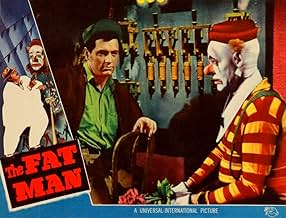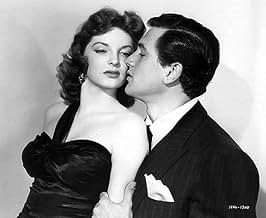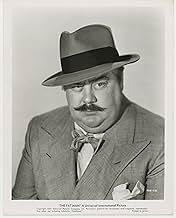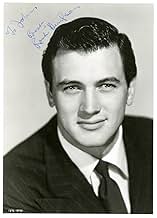Ajouter une intrigue dans votre langueA dentist's murder is investigated by hefty sleuth Brad Runyan.A dentist's murder is investigated by hefty sleuth Brad Runyan.A dentist's murder is investigated by hefty sleuth Brad Runyan.
Eric Alden
- Guard
- (uncredited)
Parley Baer
- Police Detective O'Halloran
- (uncredited)
Ray Bennett
- Phil
- (uncredited)
Peter Brocco
- Racetrack Bookkeeper
- (uncredited)
Douglas Carter
- Stage Manager
- (uncredited)
Jack Chefe
- French Chef
- (uncredited)
Avis en vedette
When I was growing up, pre-television, we used to listen to many radio shows. One of these was The Fat Man, starring J. Scott Smart. This, as with some other radio shows, was made into a movie. The casting of Smart in the title role was good, since he looked the part and the sound was identical to the radio program.
In virtually every radio show, Bradford Runyan is hired to solve a crime; the film carries on the tradition. However, the radio program lasted for only a half hour, and even though there was a "time compression" effect, there was time to do significantly more in the film. As an example, Runyan asks a lady to dance, and when she accepts, he acquits himself well. That could never have worked on the radio program, to be sure.
For those of us who remember the program, there's a lot of nostalgia in the film. For those who never heard the show (such as my wife), it's still okay, but probably not as valued.
In virtually every radio show, Bradford Runyan is hired to solve a crime; the film carries on the tradition. However, the radio program lasted for only a half hour, and even though there was a "time compression" effect, there was time to do significantly more in the film. As an example, Runyan asks a lady to dance, and when she accepts, he acquits himself well. That could never have worked on the radio program, to be sure.
For those of us who remember the program, there's a lot of nostalgia in the film. For those who never heard the show (such as my wife), it's still okay, but probably not as valued.
The Fat Man opens with the murder of a dentist. We spend a good chunk of the next hour wondering not so much who did it, as why. It's a fairly straightforward plot, but one with many threads and characters, including a clown, some dental records, a just-released convict who comes into some money and then disappears, and a police detective who—unusually for private eye movies—is open, cooperative, and even intelligent!
J. Scott Smart looks comfortable in the role of Brad Runyan, aka the Fat Man. Familiar faces fill the rest of the cast, including Jayne Meadows in a good serious role as the dentist's nurse; Jerome Cowan as the helpful if bemused policeman; Clinton Sundberg as a kind of goofball assistant; and an eager-looking young Rock Hudson as the con and Julie London as his sometime girlfriend.
The Fat Man was apparently a radio detective making a jump to movies that didn't take; not having any familiarity with the radio program, I can only say that this portly detective is considerably more physically active than the obvious comparison: whereas Nero Wolfe rarely emerges from his brownstone on 35th Street, Brad Runyan thinks nothing of hopping a flight to California, risking life and limb in a shootout, or even dancing in a nightclub. (He does, however, share Wolfe's passion for fine food.) To put it another way—Smart as Runyan is easily closer akin to William Conrad as Cannon than Conrad as Wolfe.
The film as a whole offers bits of humor, some action, and a pretty fair mystery with quite a well done climactic scene. If they had indeed turned this into a series, I would seek out the other entries; however, I'm afraid 1951 was not the right time to start a detective series—at least, not one for the big screen.
J. Scott Smart looks comfortable in the role of Brad Runyan, aka the Fat Man. Familiar faces fill the rest of the cast, including Jayne Meadows in a good serious role as the dentist's nurse; Jerome Cowan as the helpful if bemused policeman; Clinton Sundberg as a kind of goofball assistant; and an eager-looking young Rock Hudson as the con and Julie London as his sometime girlfriend.
The Fat Man was apparently a radio detective making a jump to movies that didn't take; not having any familiarity with the radio program, I can only say that this portly detective is considerably more physically active than the obvious comparison: whereas Nero Wolfe rarely emerges from his brownstone on 35th Street, Brad Runyan thinks nothing of hopping a flight to California, risking life and limb in a shootout, or even dancing in a nightclub. (He does, however, share Wolfe's passion for fine food.) To put it another way—Smart as Runyan is easily closer akin to William Conrad as Cannon than Conrad as Wolfe.
The film as a whole offers bits of humor, some action, and a pretty fair mystery with quite a well done climactic scene. If they had indeed turned this into a series, I would seek out the other entries; however, I'm afraid 1951 was not the right time to start a detective series—at least, not one for the big screen.
William Castle is today mostly remembered for his clever exploitative gimmicks, which made horror films like "Macabre," "House on Haunted Hill," "The Tingler," etc., both terrifying and fun.
But he started out making movies in another tradition—noir. Without gimmicks.
In 1951's low-budget "The Fat Man," made for Universal, Castle borrows from another medium, taking a popular radio mystery program and transforming a broadcast melodrama into an exciting yet droll movie thriller, with unexpected pleasures.
His lead, the basso profundo J. Scott Smart, is exceptionally good in his role as Brad Runyon, alias The Fat Man, a private detective who is not your average PI. Brad is a well-spoken, well-read, pleasure- loving, sweet-tempered, middle-aged, 270-lb mountain of a man wearing a quirky moustache right out of a Nineteenth-Century daguerreotype.
However, The Fat Man is neither a hog nor a dunce. J Scott Smart's full and fine performance turns an unconventional private eye into a charming and intelligent investigator who is much cleverer than anyone else around him. (He's also tough when need be, packing a snub-nosed .32, and even graceful when the occasion calls for it, wowing with his agile and bouncy, if pachydermic dance steps.)
After her employer is found dead, dental nurse Jayne Meadows (in real life, married to pioneering late night TV host Steve Allen) seeks out the food-loving Fat Man, who, in an entertaining intro, is showing a collection – a mélange, if you will -- of a great many chefs how to not spoil the broth.
Certain dental records are missing, and the nurse believes this may have something to do with the dentist's death. (Meadows plays the dental nurse with sympathy and with more than a little sadness.)
The unusual details of the dentist's death and his nurse's obvious distress hit a nerve, and The Fat Man takes on the case for nothing! (Always interested in filling himself, he just can't brush off such a toothy puzzle.)
The trail of the missing dental X-Rays leads Private Eye Runyon from New York City to California -- and to an ex-con, nicely played by a young Rock Hudson.
A sensible professional, Runyon works closely with the police, who cooperate courteously, if warily. Detective Lt. Stark, well-acted by Jerome Cowan, who himself a decade earlier had played Sam Spade's doomed partner in "The Maltese Falcon," treats him as a colleague, a refreshing change from the usual movie thriller adversarial relationship of PI vs. police.
However, another movie tradition, the great sleuth's assistant who is dumber than a pound of wet liver, is still upheld. In a nicely comic turn, Clinton Sundberg handles the chores this chowderhead is saddled with a sweet enthusiasm, submitting to all sorts of indignities with a cheerful grace. Take note that nowhere in this movie does he get a salary check or even a tip.
But The Fat Man has more to worry about than meeting a payroll. He has to sift through a couple more murders, outsmart a den of thieves, figure out the answers to an unsolved half-million-dollar armored car heist involving a posse of rent-a-cops, and face a mysterious, rather scary pratfall of clowns. (In much more than the usual gratuitous guest-star appearance, famous clown Emmett Kelly pops up here in a fully-realized three-dimensional portrayal. He even speaks – and well, at that!)
The plump private eye is put on the trail of a night-club entertainer played by the sultry Julie London, who possesses a valuable secret. Vulnerable under her veneer of hardness, the sensual beauty, who, in real life, was married to TV cop Jack Webb, sends Runyon in the right direction, leading eventually to an exciting show-down which is both scary and surrealistic.
Cameraman Irving Glassberg (celebrated for being one of the discoverers of Clint Eastwood) allocates his limited budget prudently, nourishing the film's noirishness with skill and finesse. His intelligent camera moves restlessly across patterned floors, picking up random gleams from the polished glass and metal of an elegant hotel lobby late at night, the few humans abroad seen as ominous shadows.
A circus subtheme effectively adds still another dimension to the film. At one point, for instance, the Fat Man rents a British two- seat sports car -- an MG or a Morgan -- that looks like it may be too tiny for a five-year-old, let alone a behemoth like himself. As he shoehorns himself into the tiny car, which isn't much more than a roller skate with a motor, you can practically hear it groan. The camera mercifully looks away, before we learn how he manages to squeeze out of it.
In another telling, even unsettling scene, what looks to be a whole platoon of bank guards in black SS-like uniforms tumble out of an armored truck, like one of those teeny-weeny circus clown cars that can hold an entire sideshow of grease-painted circus clowns plus their painted poodles and made-up monkeys plus a lifetime supply of inflated balloons .
Filmed only a few years after the Second World War, in crisp black and white, "The Fat Man," though an unpretentious B movie that sort of got lost in the crowd, is a rich chowder of admirable acting and appealing directorial details. Without gimmicks.
But he started out making movies in another tradition—noir. Without gimmicks.
In 1951's low-budget "The Fat Man," made for Universal, Castle borrows from another medium, taking a popular radio mystery program and transforming a broadcast melodrama into an exciting yet droll movie thriller, with unexpected pleasures.
His lead, the basso profundo J. Scott Smart, is exceptionally good in his role as Brad Runyon, alias The Fat Man, a private detective who is not your average PI. Brad is a well-spoken, well-read, pleasure- loving, sweet-tempered, middle-aged, 270-lb mountain of a man wearing a quirky moustache right out of a Nineteenth-Century daguerreotype.
However, The Fat Man is neither a hog nor a dunce. J Scott Smart's full and fine performance turns an unconventional private eye into a charming and intelligent investigator who is much cleverer than anyone else around him. (He's also tough when need be, packing a snub-nosed .32, and even graceful when the occasion calls for it, wowing with his agile and bouncy, if pachydermic dance steps.)
After her employer is found dead, dental nurse Jayne Meadows (in real life, married to pioneering late night TV host Steve Allen) seeks out the food-loving Fat Man, who, in an entertaining intro, is showing a collection – a mélange, if you will -- of a great many chefs how to not spoil the broth.
Certain dental records are missing, and the nurse believes this may have something to do with the dentist's death. (Meadows plays the dental nurse with sympathy and with more than a little sadness.)
The unusual details of the dentist's death and his nurse's obvious distress hit a nerve, and The Fat Man takes on the case for nothing! (Always interested in filling himself, he just can't brush off such a toothy puzzle.)
The trail of the missing dental X-Rays leads Private Eye Runyon from New York City to California -- and to an ex-con, nicely played by a young Rock Hudson.
A sensible professional, Runyon works closely with the police, who cooperate courteously, if warily. Detective Lt. Stark, well-acted by Jerome Cowan, who himself a decade earlier had played Sam Spade's doomed partner in "The Maltese Falcon," treats him as a colleague, a refreshing change from the usual movie thriller adversarial relationship of PI vs. police.
However, another movie tradition, the great sleuth's assistant who is dumber than a pound of wet liver, is still upheld. In a nicely comic turn, Clinton Sundberg handles the chores this chowderhead is saddled with a sweet enthusiasm, submitting to all sorts of indignities with a cheerful grace. Take note that nowhere in this movie does he get a salary check or even a tip.
But The Fat Man has more to worry about than meeting a payroll. He has to sift through a couple more murders, outsmart a den of thieves, figure out the answers to an unsolved half-million-dollar armored car heist involving a posse of rent-a-cops, and face a mysterious, rather scary pratfall of clowns. (In much more than the usual gratuitous guest-star appearance, famous clown Emmett Kelly pops up here in a fully-realized three-dimensional portrayal. He even speaks – and well, at that!)
The plump private eye is put on the trail of a night-club entertainer played by the sultry Julie London, who possesses a valuable secret. Vulnerable under her veneer of hardness, the sensual beauty, who, in real life, was married to TV cop Jack Webb, sends Runyon in the right direction, leading eventually to an exciting show-down which is both scary and surrealistic.
Cameraman Irving Glassberg (celebrated for being one of the discoverers of Clint Eastwood) allocates his limited budget prudently, nourishing the film's noirishness with skill and finesse. His intelligent camera moves restlessly across patterned floors, picking up random gleams from the polished glass and metal of an elegant hotel lobby late at night, the few humans abroad seen as ominous shadows.
A circus subtheme effectively adds still another dimension to the film. At one point, for instance, the Fat Man rents a British two- seat sports car -- an MG or a Morgan -- that looks like it may be too tiny for a five-year-old, let alone a behemoth like himself. As he shoehorns himself into the tiny car, which isn't much more than a roller skate with a motor, you can practically hear it groan. The camera mercifully looks away, before we learn how he manages to squeeze out of it.
In another telling, even unsettling scene, what looks to be a whole platoon of bank guards in black SS-like uniforms tumble out of an armored truck, like one of those teeny-weeny circus clown cars that can hold an entire sideshow of grease-painted circus clowns plus their painted poodles and made-up monkeys plus a lifetime supply of inflated balloons .
Filmed only a few years after the Second World War, in crisp black and white, "The Fat Man," though an unpretentious B movie that sort of got lost in the crowd, is a rich chowder of admirable acting and appealing directorial details. Without gimmicks.
A dentist preparing to give a big speech at a conference makes the mistake of opening his door late one evening. Next thing he has been coshed and papped out of a fifteenth story window. Why? Well the rather easily pleased police conclude he succumbed to a fit of nerves, took some calming pills and... His long-term nursing assistant "Pat" (Julie London) doesn't buy that, though. She smells a rat and seeks out the help of the eponymous, renowned, investigator (J. Scott Smart). Can he put down his cutlery long enough to help her find out why she is being followed, what has happened both to her missing ex-con boyfriend "Roy" (Rock Hudson) and to $500,000 in stolen loot? In many ways this reminded me of a "Charlie Chan" mystery only here it's "Bill" (Clinton Sundberg) who takes the place of "No. 2 son" as the useful factotum who helps his boss to a conclusion in a circus. It takes just a bit too long to get going - a snappy start rather settles down a bit too much, but Smart does enough to keep the mystery rolling along with language that we'd never be allowed to use in a film nowadays. Sometimes I wonder how Rock Hudson ever achieved stardom. He was easy enough on the eye, but versatile he certainly wasn't! Watchable but you won't remember it.
So this is the film version of the radio series by Dashiell Hammett called The Fat Man - obviously a whimsical referencing of his more famous novel, film and TV series The Thin Man. But this is more than just a gimmick. The corpulent gentleman in question is the masterly J. Scott Smart, whose excess poundage adds much to his screen presence as an unusually charismatic private investigator (with gourmet tastes and a mighty appetite), to whom the rest of the cast really don't measure up. Except for the quite unknown Rock Hudson, in his first major role as Roy, an ex-convict whose teeth play a significant part in the story (and not just because of his famous sunny smile). He speaks his lines convincingly, and we can already see what the production teams meant when they said "the camera loved him". Photogenic wasn't the word.
Otherwise the film is showing both its age and its B-film budget. The dialogue is generally weak, and the continuity not too sharp. We can't always keep up with who's who in the zoo. The dental assistant gives her scream of alarm long before she could possibly have worked out that her boss has been defenestrated. And the over-long sequence of the payroll robbery leaves us unsure whether this was before or after Roy's jail sentence. (You can overdo flashbacks). Also the puritan lobby will wince at Smart's habit of calling every woman 'sweetheart', as well as one brief glimpse of blackface theatre-comedy. Still the ending, which we can't reveal, reminds us of the myriad sub-plots that can emerge when a circus comes to town.
Otherwise the film is showing both its age and its B-film budget. The dialogue is generally weak, and the continuity not too sharp. We can't always keep up with who's who in the zoo. The dental assistant gives her scream of alarm long before she could possibly have worked out that her boss has been defenestrated. And the over-long sequence of the payroll robbery leaves us unsure whether this was before or after Roy's jail sentence. (You can overdo flashbacks). Also the puritan lobby will wince at Smart's habit of calling every woman 'sweetheart', as well as one brief glimpse of blackface theatre-comedy. Still the ending, which we can't reveal, reminds us of the myriad sub-plots that can emerge when a circus comes to town.
Le saviez-vous
- AnecdotesAs Jane Adams (Jayne Meadows) is searching the files for a dental record, she passes an index card bearing the name Ray Chandler, an inside reference to the detective-story writer Raymond Chandler.
Meilleurs choix
Connectez-vous pour évaluer et surveiller les recommandations personnalisées
- How long is The Fat Man?Propulsé par Alexa
Détails
- Date de sortie
- Pays d’origine
- Langue
- Aussi connu sous le nom de
- Muerte en el circo
- Lieux de tournage
- société de production
- Consultez plus de crédits d'entreprise sur IMDbPro
- Durée1 heure 18 minutes
- Couleur
- Rapport de forme
- 1.37 : 1
Contribuer à cette page
Suggérer une modification ou ajouter du contenu manquant

Lacune principale
By what name was The Fat Man (1951) officially released in India in English?
Répondre


































